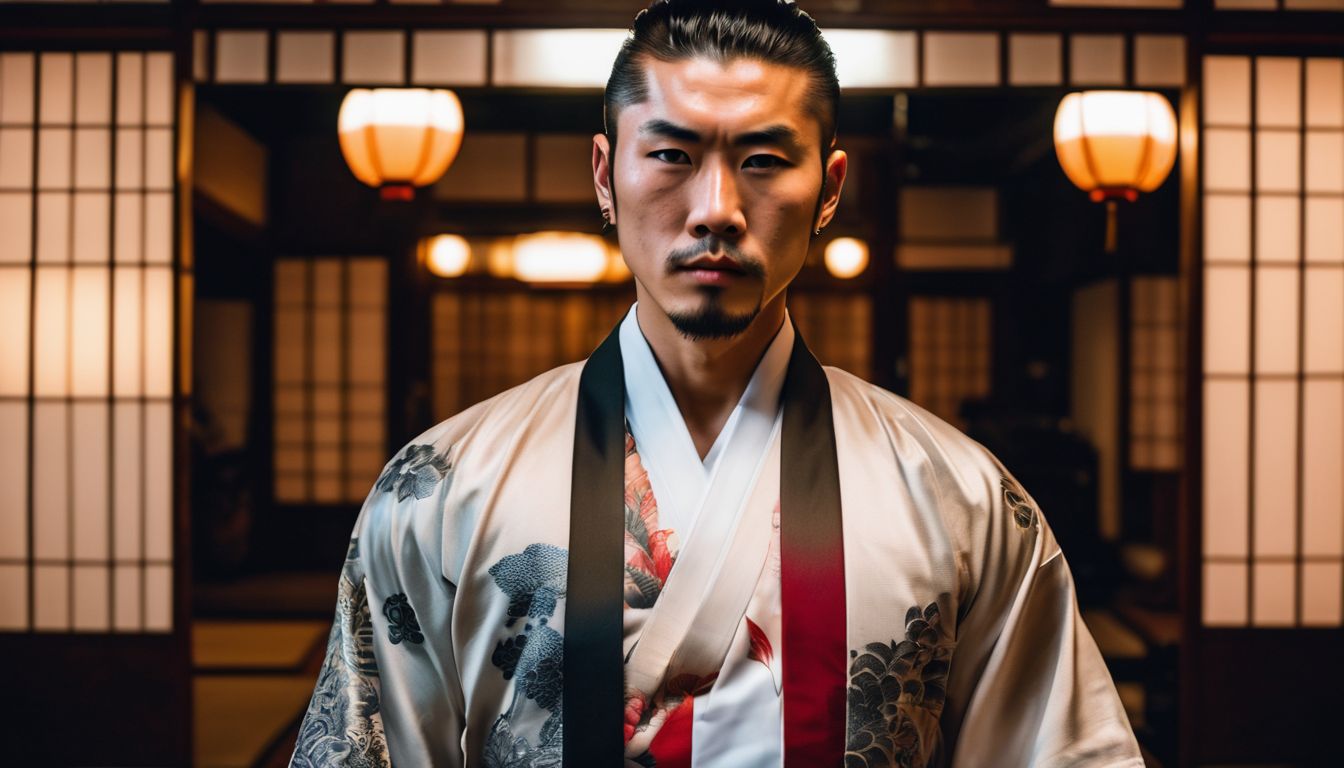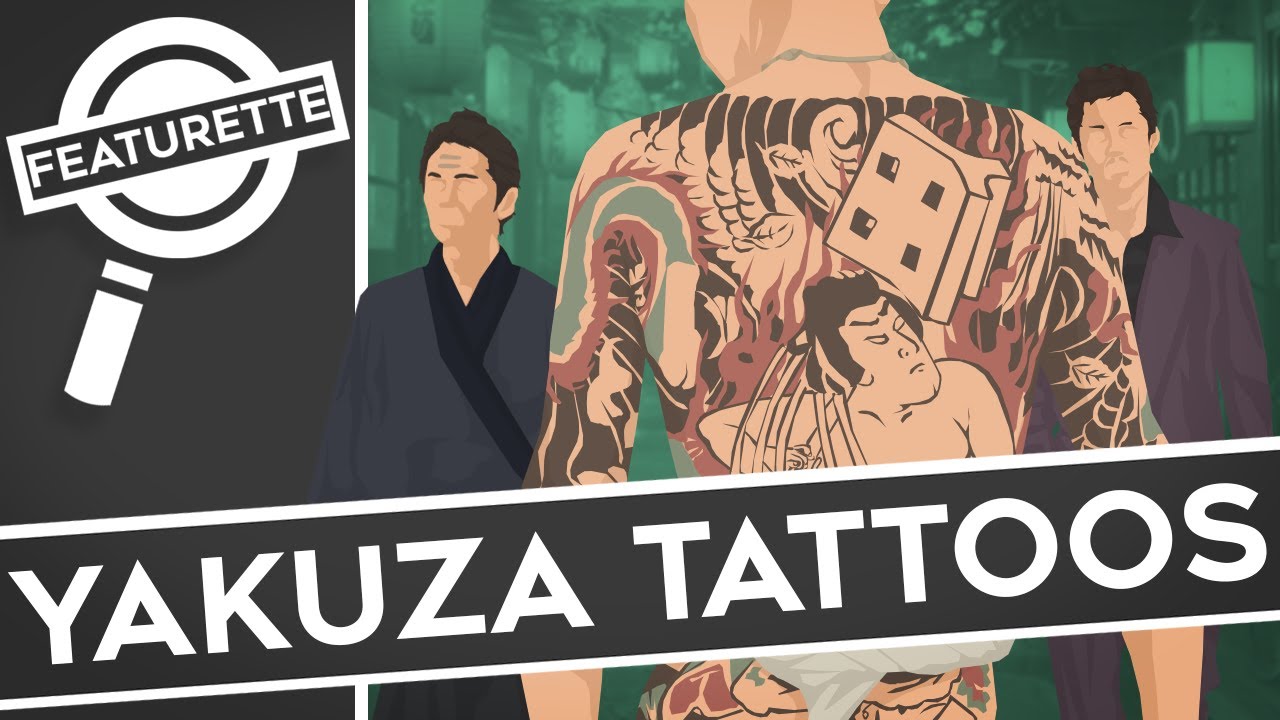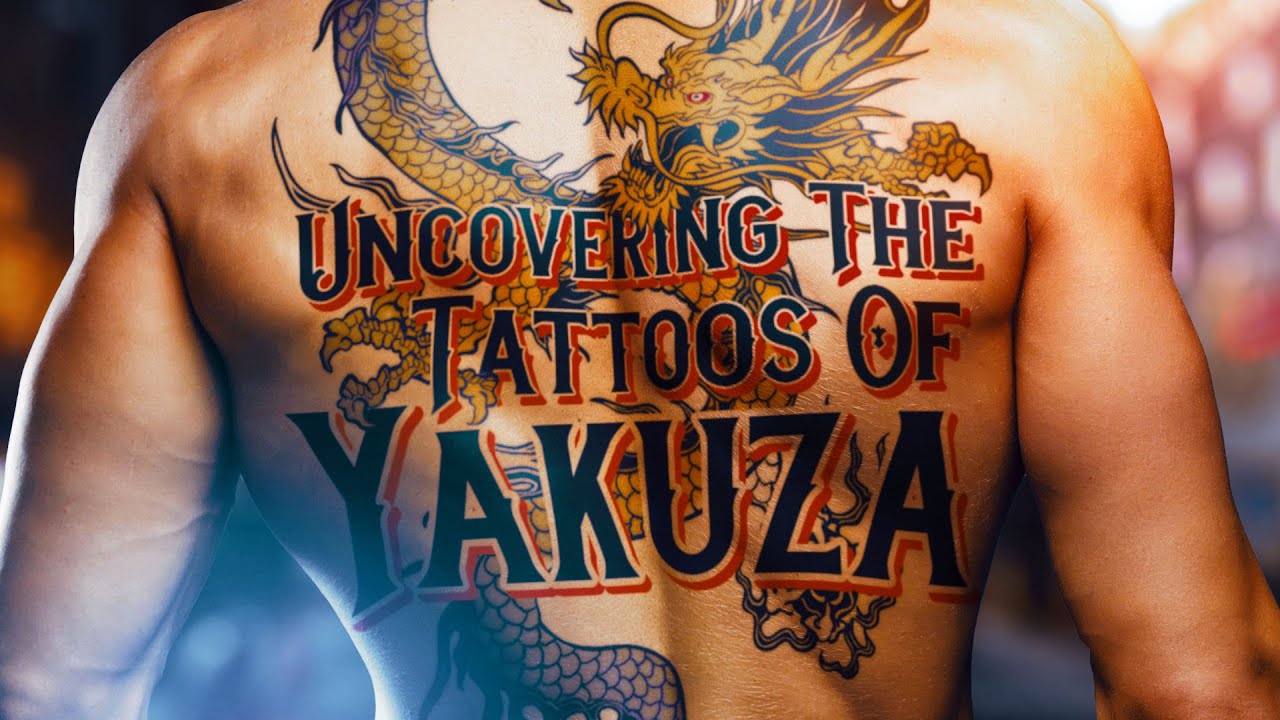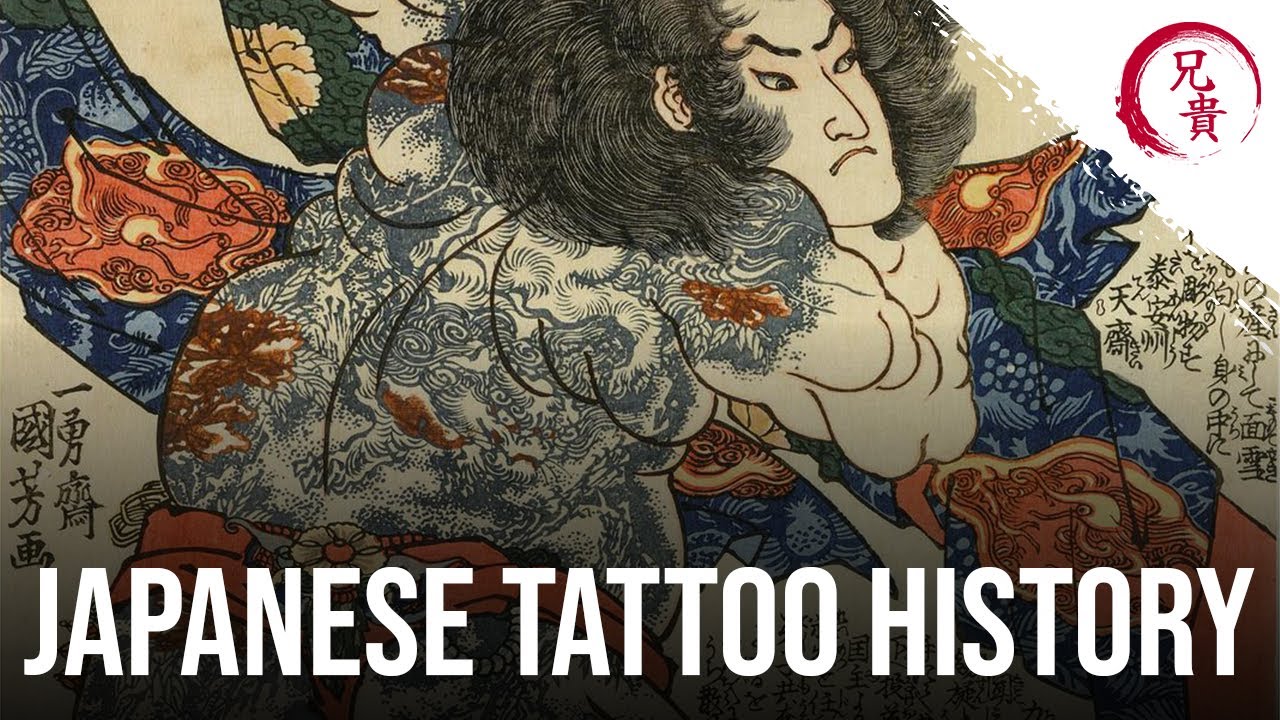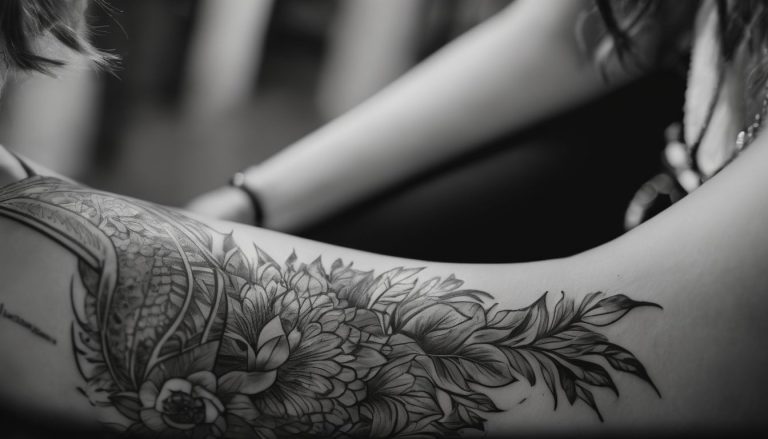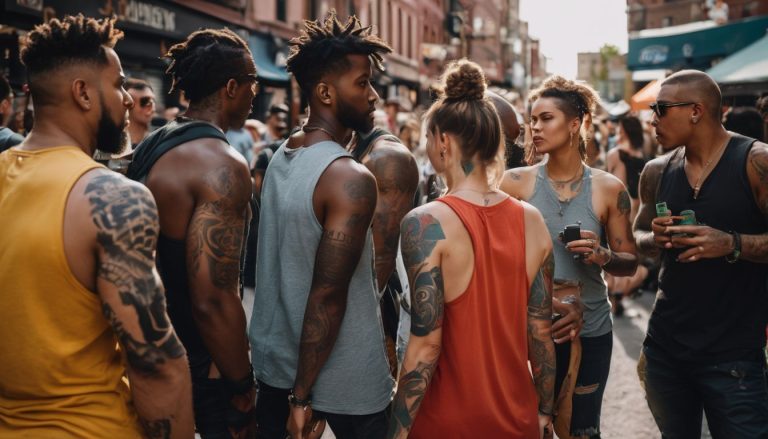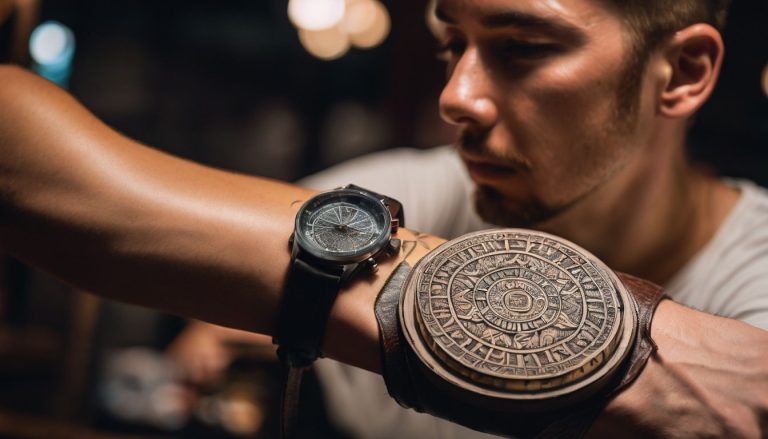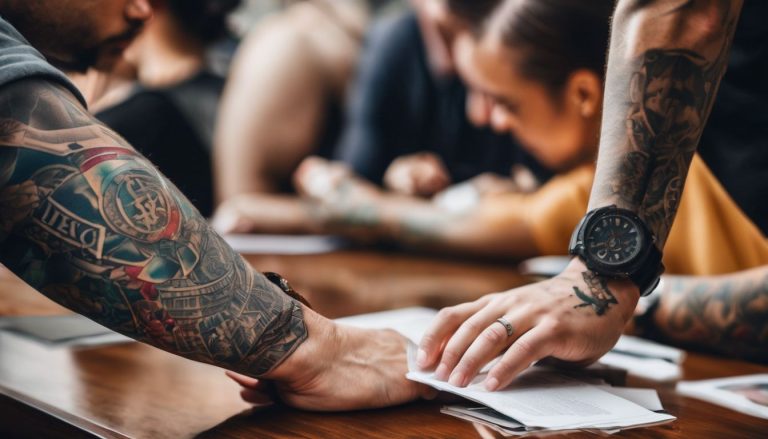Exploring the Symbolism of Yakuza Back Tattoos
Create your own unique tattoos and art for your home
Many people are fascinated by the secretive world of the Yakuza and their striking body art. Yakuza back tattoos aren’t just for show – they’re loaded with symbolism and deeply rooted in Japanese culture.
This article will dive into the meaning behind these intricate ink designs, revealing stories of power, loyalty, and tradition inked on skin. Discover the secrets behind one of Japan’s most intriguing mysteries!
Key Takeaways
- Yakuza tattoos symbolize power, loyalty, and tradition within the Japanese criminal underworld.
- The designs often feature elements like dragons, tigers, and samurais, each with their own deep meanings.
- Despite modern society’s negative views of them, these tattoos remain a key part of Yakuza identity.
- Irezumi tattoo art is marked by its use of tebori hand-carving techniques and full-body designs.
- Tattoos in this culture are more than decorative; they convey stories and values important to the wearer.
Understanding Yakuza Tattoos
Yakuza tattoos have deep roots in Japanese history and culture, with traditional Irezumi art being stigmatized for its association with criminal organizations. These tattoos carry significant meaning and symbolism within the Yakuza community.
History and origins
Tattoos in Japan date back to the Edo period when they started as a form of punishment similar to branding criminals. Over time, these marks evolved into symbols of status among the marginalized and were adopted by those in the outcast class known as “burakumin.” Irezumi, or traditional Japanese tattoos, gained notoriety within Yakuza culture for their intricate designs covering large parts of the body.
These full-body designs became a secret identifier among members, often cloaked under clothing.
Members of yakuza gangs embraced tattoos as a display of courage due to the painful process involved in getting them. The artwork is carefully crafted by skilled tattoo artists who use tebori, hand-carving techniques that have been passed down through generations.
This method adds a spiritual dimension to the ritual of tattooing within criminal organizations. Tattoo masters take years to complete fullbody designs that symbolize loyalty and commitment to yakuza life, embodying both personal narratives and collective values of this underground society.
Stigmatization of traditional Japanese art
Despite its rich cultural significance, traditional Japanese art, including Irezumi tattoos, has often been stigmatized due to its association with the Yakuza criminal organizations.
These intricate and symbolic body ink designs carry deep meanings and reflect the wearers’ commitment and loyalty. Yakuza tattoos have specific meanings and represent various aspects of the wearer’s life or beliefs.
In modern society, these traditional art forms continue to face controversy and negative perceptions due to their historical ties to crime syndicates.
Irezumi body art is a unique form of self-expression that embodies strong symbolism, but it has also been misunderstood due to its connection with organized crime in Japan. The elaborate designs symbolize an individual’s dedication and affiliation with the organization while carrying heavy metaphors not typical of other criminal groups’ markings.
Meaning and symbolism
After delving into the stigmatization of traditional Japanese art, it is essential to appreciate the meaning and symbolism behind Yakuza tattoos. These body markings represent a profound commitment to loyalty, strength, and brotherhood within the organization.
The symbolic designs such as dragons, tigers, cherry blossoms, and koi fish embody traits like power, fearlessness, luck, and protection – all integral aspects of Yakuza culture. Each tattoo tells a story of the wearer’s life or beliefs while signifying their unwavering dedication to the values upheld by this enigmatic criminal organization.
The deeply metaphorical nature of Yakuza tattoos sets them apart from those found in other criminal organizations. Their intricate designs cover large portions of the body as an outward display of affiliation with the Yakuza and a tangible embodiment of its core principles.
Notable Yakuza Back Tattoos
Displayed prominently on the backs of notorious Yakuza members are striking tattoos that tell a story of power, loyalty, and resilience. These iconic back tattoos have become synonymous with the Yakuza culture and are often associated with some of its most infamous members.
Akira Nishikiyama
Akira Nishikiyama, a prominent character in the Yakuza series, is known for his striking full-back tattoo. The tattoo depicts a fearsome white tiger with piercing eyes and powerful, detailed artwork.
This symbol represents Nishikiyama’s strength, ferocity, and determination within the organization. The intricate design showcases the depth of symbolism embedded within Yakuza tattoos and serves as a reflection of his loyalty and commitment to the Yakuza.
The portrayal of Akira Nishikiyama’s back tattoo emphasizes the significance of such body art within the Yakuza culture. The symbolism behind his tattoo exemplifies how these designs are not merely decorative but serve as visual affirmations of an individual’s allegiance and inner qualities.
Daigo Dojima
Daigo Dojima, a prominent character in the Yakuza series, displays a striking back tattoo known as irezumi. The intricately designed tattoo symbolizes power and resilience, reflecting his influential position within the organization.
As a key figure in the Yakuza world, Daigo’s back tattoo serves as a visual testament to his unwavering loyalty and commitment to the group’s values and traditions. With deep-rooted meanings embedded in each element of his impressive body art, Daigo’s tattoo stands as an emblem of authority and honor within the complex hierarchy of the Japanese criminal underworld.
The symbolism behind Daigo Dojima’s imposing back tattoo mirrors the traditional significance associated with Yakuza tattoos. It underscores themes of strength, allegiance, and tradition while adding an air of mystique to his persona.
Goro Majima
Goro Majima, a prominent character in the Yakuza series, is known for his striking dragon tattoo that covers his entire back. The tattoo symbolizes power and strength, reflecting his fearless and unpredictable nature within the criminal underworld.
Majima’s back tattoo represents the traditional Japanese art of Irezumi, showcasing the cultural significance and symbolic meaning behind Yakuza body ink. His intricate design highlights one of the key elements of Yakuza tattoos – their role as visual representations of an individual’s commitment to their organization and its values.
Majima’s portrayal with his iconic back tattoo serves as a powerful example of how Yakuza tattoos are not only visually captivating but also deeply rooted in symbolism. The dragon imagery on his back is emblematic of nobility and wisdom, embodying traits that align with both historical interpretations of dragons in Japanese culture and Goro Majima’s distinctive character traits within the game narrative.
Kazuma Kiryu
Kazuma Kiryu, the protagonist of the Yakuza series, displays a striking dragon tattoo on his back known as nobori-ryu or “ascending dragon.” This symbolizes power, strength, and resilience.
His tattoo is not only visually stunning but also represents his unwavering loyalty and commitment to the organization. Each intricate detail of the tattoo carries deep significance and reflects various aspects of Kiryu’s life and beliefs.
The dragon tattoo serves as a visual reminder of Kiryu’s dedication to the Yakuza organization and its values. Its imposing presence signifies fearlessness and evokes respect from those who recognize its symbolism within the criminal underworld.
Taiga Saejima
Continuing our exploration of notable Yakuza back tattoos, we turn to Taiga Saejima. Known for his iconic design depicting a fearsome tiger, Saejima’s tattoo symbolizes power and courage, reflecting his unwavering dedication to the Yakuza.
As an integral member of the organization, Saejima’s intricate body art serves as both a mark of allegiance and a representation of his strength within the criminal underworld.
Saejima’s impressive back tattoo is more than just body art; it embodies the deep-rooted symbolism ingrained in Yakuza culture. The ferocity of the tiger conveys a message of fearlessness and resilience, highlighting Saejima’s unyielding nature in facing adversity—a testament to the profound significance behind Yakuza tattoos and their embodiment of loyalty and fortitude.
Popular Yakuza Tattoo Designs
From fierce tigers to powerful dragons, Yakuza tattoos often depict traditional Japanese symbols such as cherry blossoms, koi fish, and samurai. Each design holds deep meaning and significance within the Yakuza culture.
Tiger
Yakuza back tattoos often feature the powerful image of a tiger, symbolizing strength, courage, and ferocity. Tigers are seen as protectors and guardians in Japanese culture, representing fearlessness and the ability to overcome adversity.
The tiger tattoo is also associated with power and authority, reflecting the wearer’s status within the Yakuza organization. This design is meticulously crafted with intricate details to showcase the fierceness and determination embodied by those who wear it.
The symbolism of the tiger tattoo holds great significance for Yakuza members, serving as a visual representation of their unwavering dedication to their group and their willingness to fiercely defend its values.
Dragon
Moving from the fierce symbolism of the tiger, we turn to another dominant figure in Yakuza tattoos: the dragon. In Yakuza culture, the dragon represents power, strength, and wisdom.
It is a symbol of good fortune and protection against harm. The nobori-ryu or “ascending dragon” tattoo adorning Kazuma Kiryu’s back in the Yakuza series reflects not only his own resilience but also encapsulates these powerful characteristics associated with the mythical creature.
Yakuza dragons are often depicted as majestic and fearsome creatures weaving through clouds or water, embodying authority and control. The intricate details of these designs hold deeper meanings such as perseverance and loyalty within the organization.
Cherry blossom
The cherry blossom, or sakura, is a prevalent motif in Yakuza tattoos, symbolizing the fleeting nature of life and beauty. This delicate flower represents mortality and the transience of existence, reminding wearers to live fully in the present.
In Yakuza culture, the cherry blossom also signifies elegance and grace amidst adversity, capturing the duality of life’s fragility and strength.
The symbolism behind the cherry blossom adds depth to Yakuza back tattoos, reflecting not only an appreciation for beauty but also an understanding of life’s impermanence. Members often choose to incorporate this symbol into their body art as a powerful reminder of resilience and fortitude in the face of challenges.
Koi fish
The koi fish is a popular motif in Yakuza tattoos, representing perseverance and determination. It symbolizes the ability to overcome adversity and achieve success despite challenges.
The vibrant colors of the koi also add to its symbolism, with different hues carrying various meanings such as courage, transformation, and good fortune. Notably, the imagery of a koi swimming upstream against strong currents signifies resilience and ambition – traits highly valued within Yakuza culture.
Intricately detailed and often depicted in dynamic poses, koi fish tattoos are a testament to the wearer’s inner strength and unwavering spirit. Their inclusion in Yakuza body ink further reinforces the deep-rooted significance of these traditional Japanese designs, showcasing not only an individual’s dedication to their organization but also their personal journey towards triumph over life’s obstacles.
Snake
Yakuza tattoos often feature snake designs, symbolizing power, cunning, and danger. The snake is a potent symbol in Japanese culture, representing both positive and negative aspects such as transformation and rebirth or deceit and danger.
Yakuza members may choose a snake tattoo to showcase their adaptability and survival instincts in the face of adversity while also signifying their willingness to strike when necessary.
Snake tattoos are typically highly detailed, covering a large area of the body, reflecting the wearer’s unwavering commitment to the organization.
Samurai
Moving from the symbolic representation of snakes in Yakuza tattoos, let’s delve into the depiction of samurai. The image of a samurai is a common design seen in Yakuza body art. These tattoos symbolize honor, loyalty, and discipline – traits highly esteemed within the Yakuza organization.
The samurai tattoo signifies strength and resilience, echoing the traditional values upheld by members of this criminal syndicate. This symbolism aligns with the unwavering commitment and code of conduct that individuals within the Yakuza adhere to, making it a powerful emblematic choice for their body ink.
Samurai tattoos are more than just elaborate designs; they carry profound meaning rooted in Japanese history and warrior culture. Each stroke and detail in these tattoos embodies courage, duty, and self-sacrifice – characteristics synonymous with both samurais and members of the Yakuza.
Symbolism Behind Yakuza Tattoo Designs
Yakuza tattoos such as tigers, dragons, cherry blossoms, koi fish, snakes and samurais hold deep symbolism of power, loyalty, luck, fearlessness and protection – explore the rich meanings behind these iconic designs.
Read more about the cultural significance of Yakuza tattoos in our blog!
Power and strength
Yakuza tattoos emanate power and strength, reflecting the inner resilience and authority of those adorned with them. The intricate designs, often featuring fierce creatures like dragons or intimidating symbols like samurai, serve as visual representations of the bearer’s fortitude and dominance within the organization.
These tattoos are not merely decorative but hold a deep significance, showcasing the unwavering might and influence wielded by Yakuza members in their realm of operation.
The symbolic imagery etched into these impressive body ink creations portrays an undeniable sense of supremacy that is integral to Yakuza culture. Each stroke of the tattoo needle embodies a sense of control and vigor, emphasizing the unyielding command possessed by those affiliated with this notorious underworld association.
The embodiment of power within these tattoos underscores the unwavering influence exerted by each member within their criminal fraternity.
Loyalty and brotherhood
Yakuza tattoos symbolize loyalty and brotherhood, serving as a visual representation of the wearer’s unwavering commitment to their organization. These intricate body markings carry deep significance, signifying the strong bond amongst Yakuza members and their dedication to upholding the group’s values.
Each design reflects a sense of belonging and camaraderie within this tight-knit community, reinforcing the importance of trust and allegiance in their criminal underworld.
Furthermore, Yakuza tattoos are not just decorative; they serve as a constant reminder of the honor and solidarity that members hold dear. The elaborate nature of these tattoos demonstrates an individual’s utmost devotion to their clan, emphasizing the unbreakable unity that defines Yakuza culture.
Luck and protection
Transitioning from the bonds of loyalty and brotherhood, the symbolism behind Yakuza tattoos also encompasses themes of luck and protection. Yakuza tattoos are believed to offer a sense of safeguarding and fortune to those who wear them, serving as a form of spiritual defense in their perilous lifestyle.
The intricate designs are not merely ornamental but are deeply ingrained with layers of meaning that signify resilience, good fortune, and an unwavering shield against adversity.
Embedded within these tattoos is a profound belief in the power of protection against harm or misfortune. This element represents an integral part of Yakuza culture by providing its members with both physical and metaphysical armor in facing life’s inevitable challenges.
Fearlessness
Transitioning to the symbolism of fearlessness, Yakuza tattoos often depict fierce creatures and warriors, symbolizing strength and courage in the face of adversity. The dragon, a common motif in these tattoos, represents fearlessness and power, emphasizing the Yakuza members’ ability to confront challenges with unwavering bravery.
Additionally, samurai-themed tattoos exemplify stoicism and resilience, embodying the fearless spirit of those who bear them. These intricate designs serve as visual declarations of indomitable resolve within the Yakuza culture.
Enduring stigmas associated with traditional Japanese art have contributed to an enduring fascination with Yakuza back tattoos among enthusiasts worldwide. With their deep-rooted meanings and captivating aesthetics, these symbolic expressions continue to fascinate artists and historians alike.
Modern Yakuza and the Symbolism of Tattoos
The impact of modern society on Yakuza culture has led to changes in the significance and visibility of their tattoos. Today, the Yakuza and their tattoos are still steeped in tradition, but also face controversy and changing perceptions.
Impact of modern society on Yakuza culture
Modern society has significantly impacted Yakuza culture, influencing the way tattoos are perceived and practiced within the organization. As Japan modernizes, there is an increasing stigma and legal scrutiny around Yakuza tattoos, leading many members to opt for more discreet designs or getting their ink in less conspicuous areas of their bodies.
Moreover, due to the association of Yakuza with criminal activities, individuals bearing traditional Yakuza tattoos may face discrimination and difficulties in various aspects of life.
This has forced some members to rethink their approach to tattooing as a symbol of loyalty and commitment to the organization.
The Yakuza and their tattoos today
Yakuza tattoos continue to hold significance in modern times, representing unwavering commitment and loyalty to the organization. These intricate body markings are a visual declaration of one’s allegiance and adherence to the principles of the Yakuza.
Despite increasing societal disapproval and legal restrictions, many Yakuza members still proudly display their tattoos as a symbol of their association with this notorious criminal network.
The tradition remains an integral part of Yakuza culture, serving as a visible testament to their dedication.
Controversy and perceptions
Some view Yakuza tattoos as captivating works of art, while others associate them with criminal activity. The public often perceives these body markings with fear and apprehension due to their long-standing association with Japan’s organized crime groups.
However, many tattoo enthusiasts appreciate the intricate designs and deep symbolism behind Yakuza tattoos, recognizing them as a unique form of artistic expression and cultural tradition.
Despite this, controversy surrounds the public display of Yakuza-style tattoos in Japan, leading to discrimination against individuals who choose to adorn themselves with such intricate body ink.
The perception of Yakuza tattoos varies widely depending on cultural context and personal viewpoints. While some critics denounce these tattoos as symbols of criminal affiliation, others recognize the historical and artistic significance embedded within each design.
Conclusion
In conclusion, Yakuza back tattoos hold deep symbolism and serve as a powerful representation of loyalty and dedication. The intricate designs carry significant meanings that reflect the wearers’ personal beliefs and values.
Despite stigmatization, these tattoos continue to be an integral part of Yakuza culture, showcasing their unwavering commitment to tradition and brotherhood in the modern world. This exploration sheds light on the profound significance of Yakuza back tattoos within the context of Japanese criminal organizations.
FAQs
1. What do Yakuza back tattoos symbolize?
Yakuza back tattoos often represent the wearer’s identity and status within Japanese criminal organizations, with each design carrying its own meaning from traditional Irezumi art.
2. Are all Japanese Irezumi tattoos related to crime?
Not all Irezumi body ink is linked to crime; while some designs have been adopted by the Japanese underworld, many people appreciate these symbolic Japanese tattoos for their beauty and cultural significance.
3. Can you explain the meanings behind different Yakuza tattoo symbols?
Certain designs in Yakuza criminal tattoos carry specific symbolism; for example, dragons may signify strength or wisdom, koi fish can represent perseverance, and cherry blossoms might convey the fleeting nature of life.
4. Why are full-back Yakuza tattoos significant?
Full-back pieces are prominent in the world of Japanese gang tattoos because they display a member’s commitment to their yakuza family and often tell a story through intricate symbolism that covers their entire back.

